Fed up villagers turn potholes into attraction
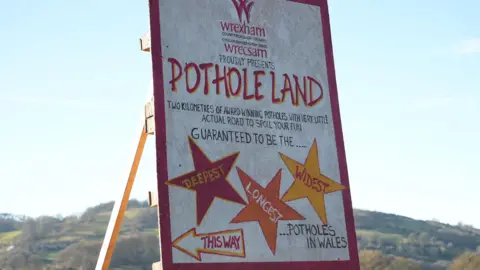 BBC
BBCIn a small picturesque community on the edge of Wrexham county, a new so-called "tourist-attraction" has popped up.
Pothole Land, just above Pontfadog in the Ceiriog Valley, is a tongue-in-cheek response to what one resident has called "years of concerted council inaction" in maintaining their roads.
Another, Russell Kirk, who lives at the top of a lane with what he said were the "widest, deepest and longest" potholes in Wales, described it as "treacherous" and getting "progressively worse".
Wrexham Council declined to comment.
"People won't come up here anymore," said Mr Kirk, "and that includes the bin men sometimes.
"We are cut off from life, forgotten about."
He added he and his neighbours regularly reported the potholes to Wrexham county borough council, but "nothing has been done".
The creation of Pothole Land is the community's "elegant" response to their predicament, he said.
"It's better not to get angry... let's bring the humour and raise the profile of this, so something can be done."
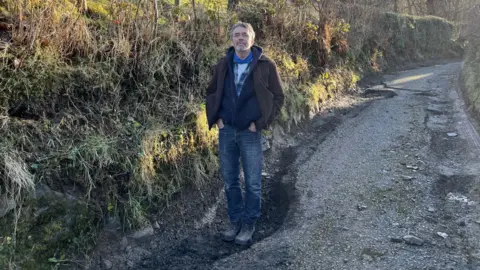
Edd Rayner, who lives near Mr Kirk, said every journey was "an expedition".
"It's a tiny minor unclassified road, we expect it to be lumpy and bumpy, a few potholes here and there, that's OK.
"But, they're not potholes, they're bomb craters. It takes years of concerted council inaction to get to where we are now."
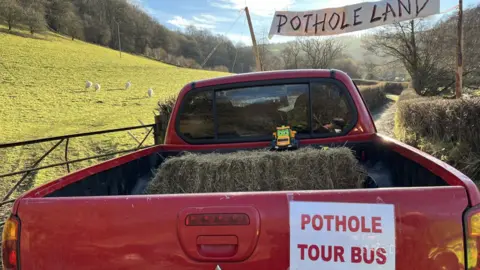
Another resident from Nantyr, near Glyn Ceiriog, further along the valley, said her road was so "horrific" no-one would visit them and they cannot get deliveries.
Jan Gilchrist said she understood the council's budget was stretched but the road had not been repaired "for years".
"The costs to our cars is phenomenal," she added.
"We have to leave the house early to get to work. It should only take five minutes to get down to the village, it takes 15."
"We pay our taxes... what are we getting?"
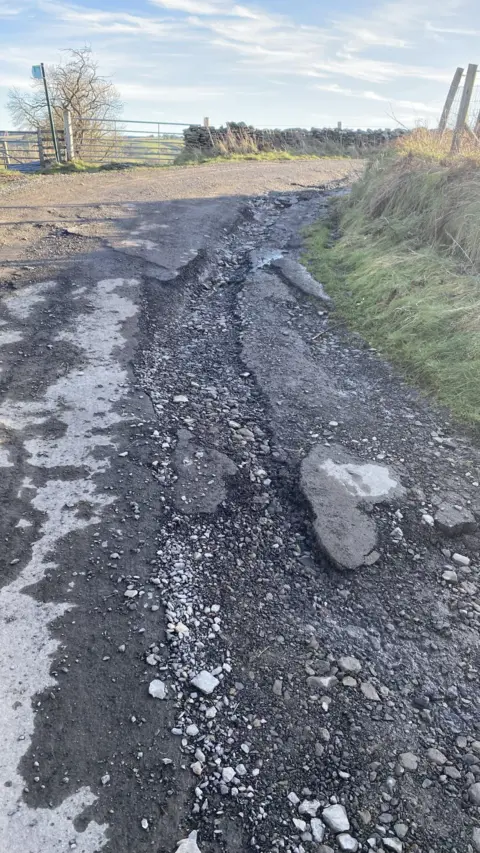 Jan Gilchrist
Jan GilchristThe residents of the Ceiriog Valley may feel isolated as a result of their pothole problem, but they are certainly not alone.
An annual survey carried out by the Asphalt Industry Alliance showed in 2024 local road conditions were at an all-time low due to "decades of underfunding".
It estimated it would cost more than £16bn to tackle the backlog of repairs in England and Wales.
But with squeezed finances, local authorities were having to prioritise.
Next door to Wrexham, in Flintshire, the lead member for Streetscene which looks after road maintenance, councillor Glyn Banks, said its £1.7m budget was less than half of what was needed to maintain a "steady state" in the road network.
"It's a never-ending circle, squeezed budgets everywhere and we have to fight our corner.
"It's a front-facing service that everyone sees every day, from recycling centres to the road network."
He added a £170,000 purchase of a machine which speeds up the process and efficiency of repairing potholes was going some way in helping stay on top of the issue.
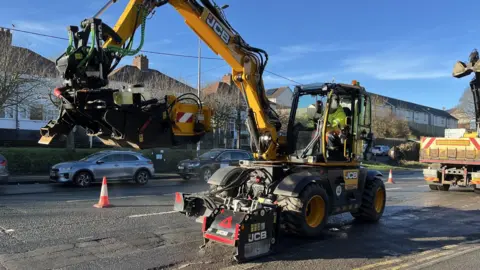
But while potholes cost money, they are also helping to make it.
The AA said the total cost of fixing vehicles it attended in the UK which had broken down because of poor road surfaces in 2024 was £579m.
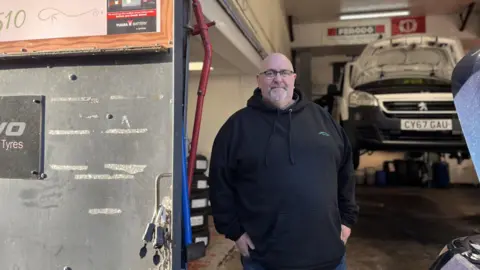
Vince Crane from the organisation said there had been more than 600,000 pothole related incidents last year, causing damage to wheels, tyres, body work and suspension.
In Pontfadog, Andy Jones from Ceiriog Valley Service centre said he was "getting busier and busier" with jobs relating to pothole damage, with five coming in over the past week.
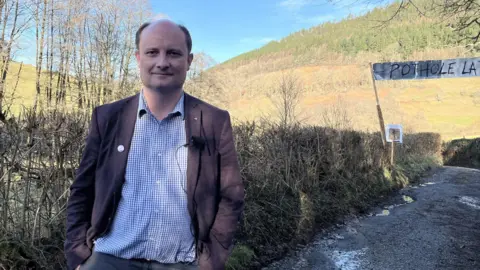
Back in Pothole Land, Edd Rayner said he was expecting the council would come and see them - if only to ask them to take their signs down.
"We feel like we've been forgotten up here and Wrexham don't know where we are... well at least now they've got a good reason to come and visit us."
He added if the council would bring some tarmac, they would work with them.
"I'll gather a gang together, we'll fill in the holes ourselves."
